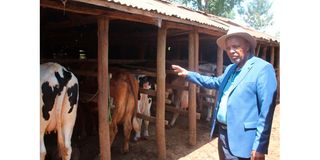My big save, thanks to mixed farming

Dr Gilbert Bor at his farm in Kapseret, Uasin Gishu County.
What you need to know:
- Dr Gilbert Bor uses manure from his cows to grow various crops, including maize whose planting season has kicked off.
- Besides maize, he also farms a variety of vegetables and keeps bees, earning handsomely in rain or shine.
Some three kilometres from Eldoret-Kapsabet Road in Kapseret, Uasin Gishu County, one finds Sinendet village. As many other parts of the country, the village is dry and it is reeling from the effects of the ongoing dry spell and the rising cost of fertiliser as farming is the main economic activity for most residents.
Dr Gilbert Bor, a lecturer at Catholic University of Eastern Africa, farms in the village. But as many farmers across the country feel the pinch of the twin challenges, Dr Bor has cushioned himself.
A diesel-powered tractor connected to a milling machine welcomes the Seeds of Gold team to his farm. Next to the machine is a yellow sack and a polythene sheet where animal manure has been spread.
“This machine has three sieves, number one is for grinding grains while two maize stovers,” says Gilbert Mutembei, a worker on the farm.
“We use number three to make our organic fertiliser from dried cow dung,” he adds.
Dr Bor has 28 dairy cows of the Brown Swiss, Ayrshire and Friesian breeds kept under the zero-grazing system. The animals do not only give him milk but also the manure that has come in handy as the cost of fertiliser rises.
“We collect the dung and let it decompose for four months, then spread on the polythene sheet to dry for at least three days before we mill. In a day, we mill 40 to 50 kilos and in the next two weeks our plan is to have over 20 tonnes in readiness for planting,” he says, adding he will now buy little inorganic fertiliser to mix with manure.
A 50kg bag of inorganic fertiliser is currently selling at between Sh5,400 and Sh6,000.

Dr Gilbert Bor at his farm in Kapseret, Uasin Gishu County.
“I am lucky that I have dairy cows and this is one of the benefits of mixed farming. I use manure to grow maize for silage and for consumption, fodder grasses like lucerne and vegetables,” explains Dr Bor, who mills the manure and stores in sacks before he uses.
He farms on 15 acres, six which he has leased. Maize sits on 10 acres, fodder grass on four and vegetables intercropped with coffee on the rest.
From his seven lactating cows, he milks 130 to 140 litres daily with the high-yielder offering 25 litres.
The calves consume 20 litres of milk in a day.
He sells the produce to a Kenya Dairy Board licensed trader at Sh42 a litre. The buyer in turn sells to a processor.
“The cost of producing one litre of milk is between Sh30 and Sh37, so I make some profit and this is because of the feeds I grow and formulate on my own. The challenge is that the cost of the raw materials has gone up yet the milk prices have not improved,” observes Dr Bor, adding that he buys wheat pollard, wheat bran and cotton seed cake to formulate a total mixed ratio. He requires 1,000 kilogrammes of raw materials in a week.
Initially, he used to process his milk under his farm name El-Dairy, making mala and yoghurt but he closed the business due to losses.
“At the peak we used to process 2,000 litres per day. But we now want to start selling our milk through the ATM,” offers the 69-year-old.

Dr Gilbert Bor at his farm in Kapseret, Uasin Gishu County.
Dr Bor has further brought his costs down by installing a biogas system that enables him enjoy eco-friendly energy, courtesy of his animals.
He put up the system that uses a floating drum as a bio-digester to generate the energy from cow dung in 1984.
He also uses a solar powered irrigation system to pump water from a 42-metre borehole into a 10,000-litre tank. Water from the tank is used to organically cultivate his crops.
He keeps bees in 44 hives, a venture that he says complete his mixed farm. He started apiculture last August to boost his revenue.
So what are his challenges? “The erratic weather forecasts confuse farmers. We are told it would rain, then we plant and it does not. The cost of inputs is also high, not only fertiliser but also seeds and things like fuel,” says Dr Bor, adding his wife – a retiree – helps him manage the farm.
He asks the government to come up with policies that will put more land under farming, planting more trees and use of machinery.
Dr Ruth Njoroge, a soil scientist at University of Eldoret, says organic manure has now been accepted by most farmers. She, however, says farmers should work with experts to get the right quality.
“There is need to conduct analysis on manure quality and match it to the crop nutrient demand before we can make any ratio,” says the expert.





